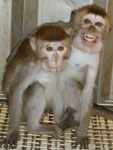Whole-genome sequencing and analysis of the Malaysian cynomolgus macaque
(Macaca fascicularis) genome東濃篤徳,坂手龍一,亀岡洋祐,高橋一朗,平田 誠,田沼玲子,増井 徹,保富康宏,長田直樹 【目的】
カニクイザルは主要な実験動物の一種であるが種内での遺伝的差異が大きい上に,交配可能なアカゲザルとの遺伝子交流の頻度は産地ごとに異なると予想される.産地ごとのゲノム解読は医科学研究,進化学研究において重要である.我々は産地による遺伝的差異を解明し,実験動物としてのカニクイザルの価値を高めるために,今回はマレーシア産カニクイザルの全ゲノム配列の決定を行った. 【方法】
(独)医薬基盤研究所・霊長類医科学研究センターで飼育されているマレーシア産カニクイザル末梢血から抽出したゲノミックDNAをサンプルとした.カニクイザル全ゲノム配列にはSOLiD 3 Plusシステムを用いて約4.9 × 109リードを得た.リファレンス配列としてインド産アカゲザルゲノムを用いた. 【結果】
インド産アカゲザルゲノムへのマッピングの結果,マッピング率は69.8%,合計1.1 × 1011 bpがマッピングされ,平均41.5倍のカバレージを持つマレーシア産カニクイザルゲノムデータを得た.インド産アカゲザルに対する1塩基多型(SNP)解析を行った結果,およそ970万のSNPが検出された.更に,得られたゲノム配列をこれまでに決定されたベトナム産カニクイザル,中国産アカゲザル,インド産アカゲザルと比較することにより,カニクイザル-アカゲザル間で完全に分離しているSNPを同定した.さらに免疫関連遺伝子群,薬剤代謝遺伝子群にかかわる遺伝子の中では60個の非同義置換が種特異的変異の候補として見つかった.またマレーシアカニクイザル集団は過去100万年の間に少なくとも3回のボトルネックを受けていることが全ゲノム配列から推察された.全SNPデータはcDNAライブラリ,BACクローン,マイクロサテライトデータとともにデータベースとして公開している(QFbase:
http://genebank.nibio.go.jp/cgi-bin/gbrowse/rheMac2/). 【考察】
非同義置換SNPはカニクイザルとアカゲザルにおける薬剤や病原体に対する種特異的な反応を規定する候補因子を探索する際に有用なデータとなる.高カバレージのカニクイザル全ゲノム配列はマカク種内での遺伝的差異の解明のための基礎データとして,さらに実験動物リソースとしての価値を高めると考えられる. 
Background
The genetic background of the cynomolgus macaque (Macaca
fascicularis) is made complex by the high genetic diversity, population structure, and gene introgression from the closely related rhesus macaque
(Macaca mulatta). Herein we report the whole-genome sequence of a Malaysian cynomolgus macaque male with more than 40-fold coverage, which was determined using a resequencing method based on the Indian rhesus macaque genome.
Results
We identified approximately 9.7 million single nucleotide variants (SNVs) between the Malaysian cynomolgus and the Indian rhesus macaque genomes. Compared with humans, a smaller nonsynonymous/synonymous SNV ratio in the cynomolgus macaque suggests more effective removal of slightly deleterious mutations. Comparison of two cynomolgus (Malaysian and Vietnamese) and two rhesus (Indian and Chinese) macaque genomes, including previously published macaque genomes, suggests that Indochinese cynomolgus macaques have been more affected by gene introgression from rhesus macaques. We further identified 60 nonsynonymous SNVs that completely differentiated the cynomolgus and rhesus macaque genomes, and that could be important candidate variants for determining species-specific responses to drugs and pathogens. The demographic inference using the genome sequence data revealed that Malaysian cynomolgus macaques have experienced at least three population bottlenecks.
Conclusions
This list of whole-genome SNVs will be useful for many future applications, such as an array-based genotyping system for macaque individuals. High-quality whole-genome sequencing of the cynomolgus macaque genome may aid studies on finding genetic differences that are responsible for phenotypic diversity in macaques and may help control genetic backgrounds among individuals. Genome Biology 2012, 13:R58 doi:10.1186/gb-2012-13-7-r58 JUL/24/2012
Copyright(C) 2012 PRI ( ). ).
| 






